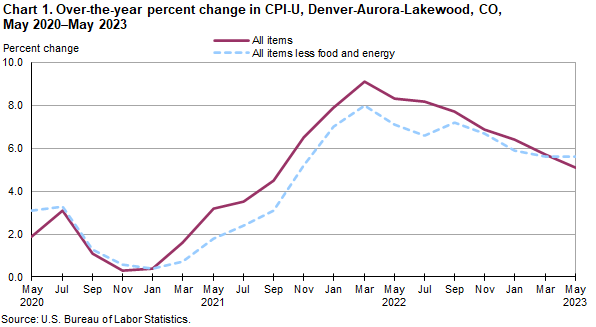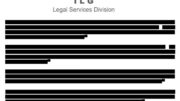By Jeffrey A. Roberts
CFOIC Executive Director
A year from now, on July 1, 2024, inflation will likely boost the maximum hourly rate governments are allowed to charge for processing Colorado Open Records Act requests from $33.58 to around $41.34 — an alarming 23 percent increase.
That’s according to an estimate calculated for the Colorado Freedom of Information Coalition by Natalie Castle, director of the General Assembly’s nonpartisan Legislative Council research staff, based on her office’s latest economic forecast.
The $41.34 hourly rate assumes the Consumer Price Index for the Denver-Aurora-Lakewood area will rise 2.9 percent in the first half of 2024. The new rate will be less than $41.34 an hour if inflation is lower than 2.9 percent, but at least $40.18 unless a period of deflation occurs between now and next June, Castle told CFOIC.
This means a CORA request that takes 10 hours to process (the first hour must be provided at no charge under the statute) will cost as much as $372. It now costs $302.
CFOIC has highlighted expensive CORA fees for several years, calling on the legislature to reevaluate the law’s “unbalanced” research-and-retrieval fee provision in a 2020 report prepared by a University of Denver law student. Sponsors of a CORA bill in the 2023 legislative session briefly floated a proposal to give news media a break on fees, but the final version of Senate Bill 23-286— signed into law by Gov. Jared Polis earlier this month — did not address research-and-retrieval charges.
Under House Bill 14-1193, enacted in 2014, the director of Legislative Council is required to adjust CORA’s maximum research-and-retrieval rate every five years according to the percentage change in the Denver-Aurora-Lakewood CPI index. Initially set at $30, the hourly rate rose to $33.58 in 2019 after a period of low inflation.
But the current maximum rate is more than the mean hourly wage for paralegals in Colorado and more than some government employees are paid to process records requests, CFOIC’s 2020 report noted. And when governments multiply the rate by many hours, which happens frequently, “the result is the same problem HB 14-1193 sought to fix by capping the rate: unaffordable charges that stymie the public’s access to public information,” the report says.
An hourly rate of $41.34, if adopted by state and local government entities, will make the cost of obtaining public records in Colorado even more unaffordable for many people. CFOIC has documented numerous examples of journalists and members of the public being charged hundreds or thousands of dollars in response to their CORA requests.
“The information gleaned for the public’s benefit through CORA requests comes with a price, too often, an unbearable one,” Aurora Sentinel editor Dave Perry wrote in column this past March. He described how his newspaper paid nearly $1,000 “for records needed to help shed light on a variety of issues the community has regularly deemed compelling.”
“The costs are often prohibitive,” Perry added.
Castle first previewed the 2024 rate a year ago, after inflation had started to soar. Then, it appeared the July 1, 2024, hourly rate would be at least $37.99.
The new estimated adjustment “is not perfectly accurate because not all data are available to perfectly match the 2019 methodology,” she noted in a spreadsheet prepared for CFOIC.
Follow the Colorado Freedom of Information Coalition on Twitter @CoFOIC. Like CFOIC’s Facebook page. Do you appreciate the information and resources provided by CFOIC? Please consider making a tax-deductible donation.





